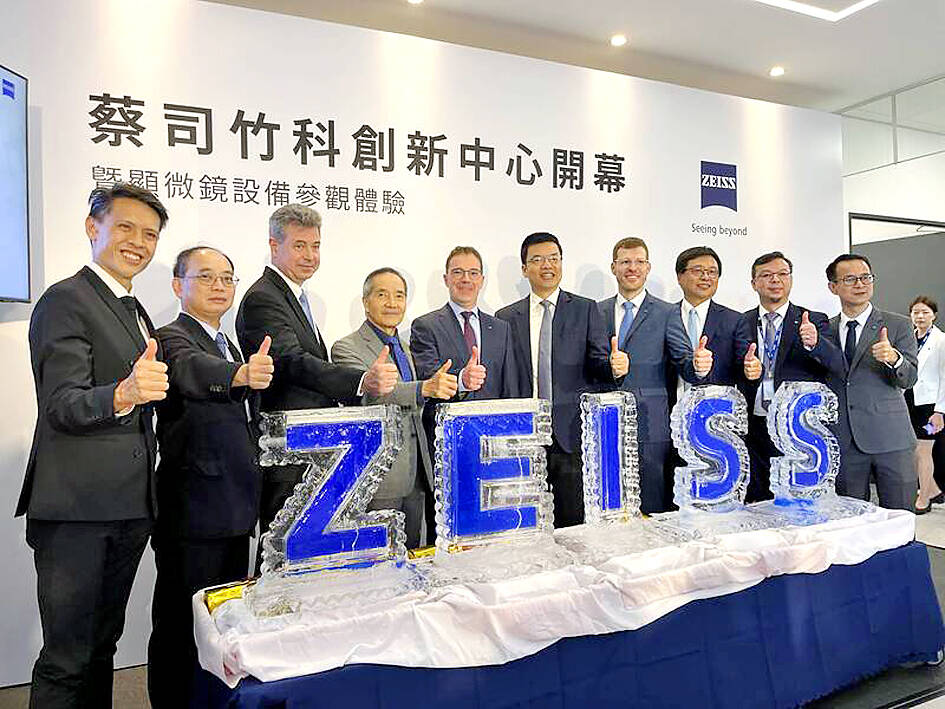Zeiss plans to accelerate its investment in Taiwan by injecting more than NT$10 billion (US $309 million) in the next 10 years after launching an innovation center in the Hsinchu Science Park (新竹科學園區) that would jointly develop advanced technologies with Taiwanese clients, the German manufacturer of optical systems and optoelectronics said yesterday.
In addition to the Hsinchu innovation center, the company has set up innovation centers in South Korea, the US and Germany.
Unlike other centers, the Taiwan center mainly focuses on developing solutions supporting next-generation process technologies and advanced packaging technologies because of the rapid uptake of artificial intelligence (AI) technology, Zeiss Taiwan head Cheong Peng Tat (章平達) said.

Photo: Grace Hung, Taipei Times
“This [investment] figure demonstrates our confidence in Taiwan's industries,” Cheong said. “We want to bring Zeiss's full portfolio to Taiwan.”
The innovation center costs NT$300 million, with a hefty investment in the semiconductor area, he said.
Zeiss Taiwan’s businesses cover five categories: semiconductor manufacturing technology, industrial quality and research, microscope, medical technology and consumer markets.
Zeiss Taiwan currently has 400 employees and plans to add 50 to 100 employees next year, Cheong said. The firm has more than tripled its headcount from 121 people in 2018.
Zeiss counts Taiwan Semiconductor Manufacturing Co (TSMC, 台積電) among its top customers. TSMC CEO C.C. Wei (魏哲家) visited Zeiss headquarters in Jena, Germany on May 16.
“TSMC has extensive collaboration with Zeiss from advanced technologies to now back-end,” He Jun (何軍), vice president of TSMC’s quality and reliability and operations, said at the center’s opening ceremony.
The Hsinchu innovation center introduces Zeiss’ latest electron microscope and light microscope technologies to serve its clients, targeting equipment used in the advanced semiconductor manufacturing processes from front-end to back-end.
3D X-ray microscopes, software solutions with artificial intelligence (AI) and other exclusive technologies for R&D and custom advanced workflows for failure analysis from wafer to package.

Shares in Taiwan closed at a new high yesterday, the first trading day of the new year, as contract chipmaker Taiwan Semiconductor Manufacturing Co (TSMC, 台積電) continued to break records amid an artificial intelligence (AI) boom, dealers said. The TAIEX closed up 386.21 points, or 1.33 percent, at 29,349.81, with turnover totaling NT$648.844 billion (US$20.65 billion). “Judging from a stronger Taiwan dollar against the US dollar, I think foreign institutional investors returned from the holidays and brought funds into the local market,” Concord Securities Co (康和證券) analyst Kerry Huang (黃志祺) said. “Foreign investors just rebuilt their positions with TSMC as their top target,

H200 CHIPS: A source said that Nvidia has asked the Taiwanese company to begin production of additional chips and work is expected to start in the second quarter Nvidia Corp is scrambling to meet demand for its H200 artificial intelligence (AI) chips from Chinese technology companies and has approached contract manufacturer Taiwan Semiconductor Manufacturing Co (TSMC, 台積電) to ramp up production, sources said. Chinese technology companies have placed orders for more than 2 million H200 chips for this year, while Nvidia holds just 700,000 units in stock, two of the people said. The exact additional volume Nvidia intends to order from TSMC remains unclear, they said. A third source said that Nvidia has asked TSMC to begin production of the additional chips and work is expected to start in the second

REVENUE PERFORMANCE: Cloud and network products, and electronic components saw strong increases, while smart consumer electronics and computing products fell Hon Hai Precision Industry Co (鴻海精密) yesterday posted 26.51 percent quarterly growth in revenue for last quarter to NT$2.6 trillion (US$82.44 billion), the strongest on record for the period and above expectations, but the company forecast a slight revenue dip this quarter due to seasonal factors. On an annual basis, revenue last quarter grew 22.07 percent, the company said. Analysts on average estimated about NT$2.4 trillion increase. Hon Hai, which assembles servers for Nvidia Corp and iPhones for Apple Inc, is expanding its capacity in the US, adding artificial intelligence (AI) server production in Wisconsin and Texas, where it operates established campuses. This

US President Donald Trump on Friday blocked US photonics firm HieFo Corp’s US$3 million acquisition of assets in New Jersey-based aerospace and defense specialist Emcore Corp, citing national security and China-related concerns. In an order released by the White House, Trump said HieFo was “controlled by a citizen of the People’s Republic of China” and that its 2024 acquisition of Emcore’s businesses led the US president to believe that it might “take action that threatens to impair the national security of the United States.” The order did not name the person or detail Trump’s concerns. “The Transaction is hereby prohibited,”